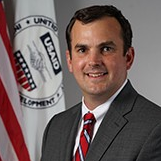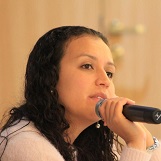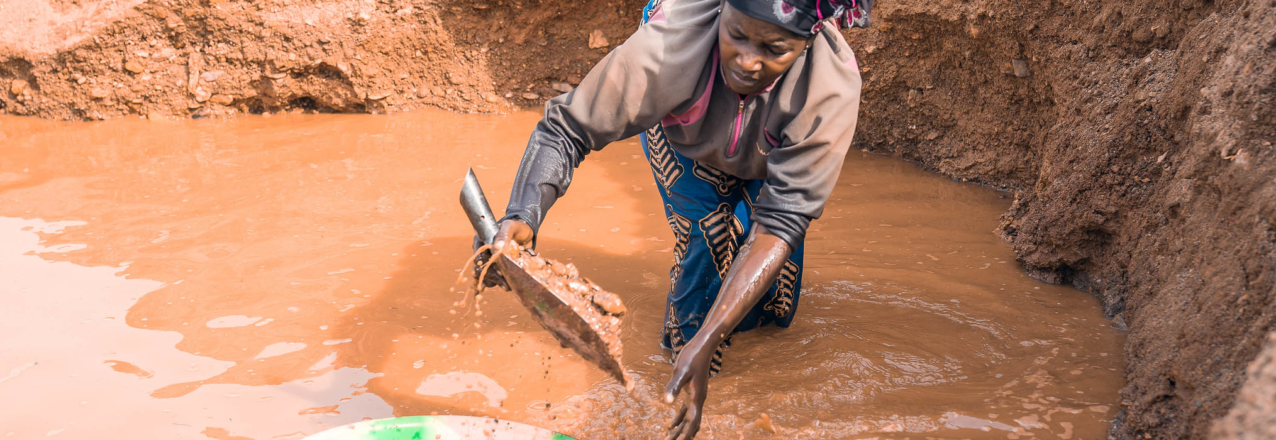USAID’s Land and Urban Office recently hosted a webinar on Digging Deeper into Artisanal &Small-Scale Mining: Gender & Women’s Economic Empowerment. View the webinar recording, and download the presentation.
In this webinar, USAID and development experts discussed on gender-related opportunities and constraints in ASM, with a focus on strategies for transforming gender biases in the sector, and ensuring that women and men have equal access to economic empowerment through ASM-related value chains.
The artisanal and small-scale mining (ASM) sector offers critical economic opportunities for women as well as a unique set of challenges. Women work at all levels of the ASM value chain, from pit labor to international trading and represent 30-50 percent of the global workforce for ASM. The most lucrative opportunities related to ASM, however, fall largely to men. Women often work longer hours for less money, lack rights to important production assets, such as land, licensing and capital, and are more exposed to social and environmental risks, including gender-based violence.
Opening Remarks:
 Jeffrey Haeni, Acting Deputy Assistant Administrator, USAID
Jeffrey Haeni, Acting Deputy Assistant Administrator, USAID
Jeffrey Haeni is the Acting Deputy Assistant Administrator in the Bureau for Economic Growth, Education and Environment (E3), where he oversees the Energy and Infrastructure, Forest and Biodiversity, Land and Urban, and Global Climate Change Offices.
Moderator:
 Kimberly Thompson, Natural Resource Governance and Conflict Advisor, USAID E3/Land Team
Kimberly Thompson, Natural Resource Governance and Conflict Advisor, USAID E3/Land Team
Kim Thompson is a Natural Resource Governance and Conflict Advisor for the E3/Land and Urban Office. She is a career foreign service officer and leads USAID’s work on artisanal and small scale mining.
Panelists:
 Joanne Lebert, Executive Director, IMPACT. Ms. Lebert leads IMPACT’s work to improve how natural resources are managed where security and human rights are at risk. Her work has focused on contributing to responsibly-sourced, conflict-free minerals and she has helped Central African governments launch and implement a regional strategy to tackle conflict minerals.
Joanne Lebert, Executive Director, IMPACT. Ms. Lebert leads IMPACT’s work to improve how natural resources are managed where security and human rights are at risk. Her work has focused on contributing to responsibly-sourced, conflict-free minerals and she has helped Central African governments launch and implement a regional strategy to tackle conflict minerals.

Jocelyn Kelly, Director, Gender, Rights, and Resilience, Harvard Humanitarian Initiative (HHI). Ms. Kelly is the founding director for HHI’s Women in War program, and currently is a fellow at HHI where she designs and implements projects to examine issues relating to gender, peace, and security in fragile states.
 Nathalia Rocio Mendoza Baron, Gender Coordinator, Alliance for Responsible Mining (ARM). Ms. Mendoza is a political scientist and internationalist, coordinator. She leads gender mainstreaming into the projects and processes of the ARM. Previously she worked on promoting women’s rights through gender mainstreaming with the government of Bogotá.
Nathalia Rocio Mendoza Baron, Gender Coordinator, Alliance for Responsible Mining (ARM). Ms. Mendoza is a political scientist and internationalist, coordinator. She leads gender mainstreaming into the projects and processes of the ARM. Previously she worked on promoting women’s rights through gender mainstreaming with the government of Bogotá.
- Gender Issues in the Artisanal and Small-Scale Mining Sector – NEW
- Artisanal and Small-Scale Mining
- Issue Brief: Artisanal & Small-Scale Mining: USAID Activities & Approaches
- Tackling Threats from Illegal Mining
- Small-Scale & Artisanal Mining Impacts on Biodiversity in Latin America
- Land and Women’s Empowerment


